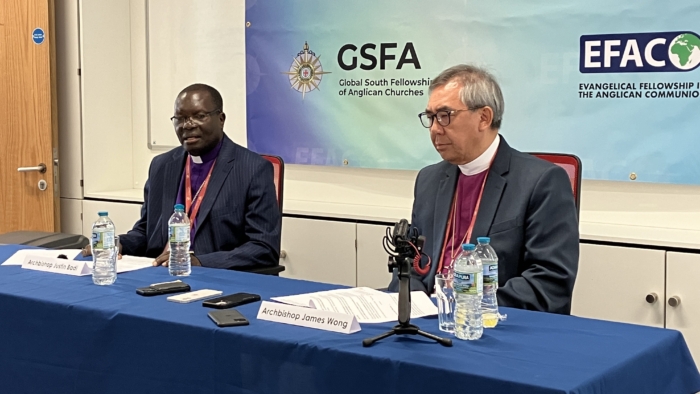Global South archbishops reject Welby’s leadership role, vow to ‘re-set’ Anglican CommunionPosted Feb 20, 2023 |
|

South Sudan Archbishop Justin Badi, left, and Indian Ocean Archbishop James Wong speak July 29 at a news conference organized by the Global South Fellowship of Anglican Churches at Kent University in Canterbury, England, during the Lambeth Conference of Anglican bishops. Photo: David Paulsen/Episcopal News Service
[Episcopal News Service] Conservative archbishops who lead 10 of the Anglican Communion’s 42 provinces issued a letter Feb. 20 rejecting the continuation of the archbishop of Canterbury’s historic leadership role in the worldwide communion, part of what the archbishops called a structural “re-set” over the Church of England’s decision to allow blessings of same-sex unions.
The archbishops, through an alliance that calls itself the Global South Fellowship of Anglican Churches, mostly from Africa and Asia, said they can no longer recognize Archbishop of Canterbury Justin Welby as the “first among equals,” citing their conservative interpretations of Bible passages that they say forbid homosexuality.
With Welby “no longer the ‘leader’ of the Communion,” they said, they will “expeditiously meet, consult and work with other orthodox primates in the Anglican Church across the nations to re-set the Communion on its biblical foundation.”The 10 archbishops who signed the statement were joined by two archbishops from breakaway provinces that are not recognized as part of the Anglican Communion, the Anglican Church in North America and the Anglican Church in Brazil. Their endorsement reflects a large slice, but not the entire swath, of Global South leadership. The leaders of at least 10 other Global South provinces did not sign the statement and are no longer listed as full members of the Global South Fellowship on its website.
Earlier this month the Church of England’s General Synod endorsed a plan to offer blessings for same-sex unions while stopping short of condoning same-sex marriage in the province’s churches. Same-sex marriage has been legal by civil law in England since 2014. The archbishop of Canterbury is the head of the Church of England, though Welby has said he himself will not conduct the blessings.
The conservative archbishops’ statement also follows the conclusion of the weeklong meeting in Accra, Ghana, of the 18th Anglican Consultative Council, one of four Anglican Instruments of Communion. The others are the Primates’ Meeting, the Lambeth Conference of Anglican bishops and the archbishop of Canterbury, who is also known as the “focus of unity.”
Impaired relations between some provinces were made plain by the absence of three Anglican provinces at ACC-18. Leaders of the provinces of Nigeria, Uganda and Rwanda have not participated in the Instruments of Communion for at least 15 years because of their objections to some provinces’ ordination of openly gay and lesbian clergy and adoption of marriage rites and blessings for same-sex couples.
On Feb. 14, The Episcopal Church’s three delegates to the ACC joined about 110 other members from 38 other provinces in approving a resolution on “good differentiation” that “affirms the importance of seeking to walk together to the highest degree possible and learning from our ecumenical conversations how to accommodate differentiation patiently and respectfully.” It tasked an Anglican commission to develop proposals for possible changes to the Instruments of Communion.
Some Global South Fellowship leaders raised similar issues at last summer’s Lambeth Conference, where they pursued ongoing criticisms of The Episcopal Church and other provinces that have welcomed LGBTQ+ people more fully into the life of their churches.
At that time, South Sudan Archbishop Justin Badi, chair of the Global South Fellowship, suggested the “degree of communion” between provinces may vary depending on how inclusive they are toward LGBTQ+ individuals. “We find that if there is no authentic repentance by the revisionist provinces, then we will sadly accept a state of ‘impaired community’ with them.”
The signatories of the Feb. 20 letter amplified those sentiments, saying, “we do not accept the view that we can still ‘walk together’ with the revisionist provinces.” The archbishops did not say they intended to split or leave the Anglican Communion – “we will not walk away,” they stated – though their position poses renewed uncertainty about what degree of unity, if any, can be maintained among all 42 provinces.
“As much as the GSFA primates also want to keep the unity of the visible church and the fabric of the Anglican Communion, our calling to be ‘a holy remnant’ does not allow us be ‘in communion’ with those provinces that have departed from the historic faith and taken the path of false teaching,” they said.
Anglican Communion Secretary General Anthony Poggo, a bishop from South Sudan, issued a written statement in response, expressing his “sadness” while also thanking the conservative leaders for their “frankness and candor.”
“The commitment to walk together was made by the primates at their meeting in 2016,” Poggo said. “It was a commitment to walk together, albeit at a distance with some provinces whose doctrine of marriage had changed. The commitment was reiterated at subsequent Primates’ Meetings, at last year’s Lambeth Conference, and last week’s meeting of the Anglican Consultative Council.”
Poggo also underscored the conservative archbishops’ pledge to “not walk away from the Communion,” adding, “I pray that these true words can inspire the whole Communion to commit to the work of faithful reform and renewal of our shared faith and order in the coming years.”
Upon Welby’s request, Poggo said he will arrange a Primates’ Meeting in the new future to include discussions of “the role of the Archbishop of Canterbury in the Communion.”
– David Paulsen is an editor and reporter for Episcopal News Service. He can be reached at dpaulsen@episcopalchurch.org.

Social Menu